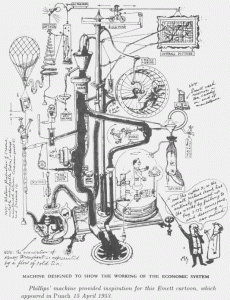The economics of digital platforms, including the sharing economy, has become a hot topic – not only among researchers but also with several new books for the non-specialist reader. Yesterday I took part in the Digital Forum organised by the Toulouse School of Economics – home of Nobel Laureate Jean Tirole, one of the first economists to analyse platforms (or two-sided or multi-sided markets). It was a packed event with some fascinating contributions. And on the train to and from Paris, I read [amazon_link id=”1633691721″ target=”_blank” ]Matchmakers[/amazon_link] by David Evans and Richard Schmalensee. This follows on from [amazon_link id=”0393249131″ target=”_blank” ]Platform Revolution[/amazon_link] by Geoffrey Parker, Marshall Van Alstyne and Sangeet Paul Choudary (which I reviewed here), and [amazon_link id=”0262034573″ target=”_blank” ]The Sharing Economy[/amazon_link] by Arun Sundararajan (here).
[amazon_image id=”1633691721″ link=”true” target=”_blank” size=”medium” ]The Matchmakers: The New Economics of Multisided Platforms[/amazon_image] [amazon_image id=”0393249131″ link=”true” target=”_blank” size=”medium” ]Platform Revolution: How Networked Markets are Transforming the Economy–and How to Make Them Work for You[/amazon_image]
[amazon_image id=”B01F26CC4S” link=”true” target=”_blank” size=”medium” ]The Sharing Economy: The End of Employment and the Rise of Crowd-Based Capitalism[/amazon_image]
All three are well worth reading – they all clearly explain the economic characteristics of digital platforms, with lots of examples. Inevitably there is some overlap but in fact the books complement each other nicely and also include different examples. [amazon_link id=”0393249131″ target=”_blank” ]Platform Revolution[/amazon_link] takes more of a business design perspective, while [amazon_link id=”B01BG90H9W” target=”_blank” ]The Sharing Economy[/amazon_link] is specifically focused on peer-to-peer markets. [amazon_link id=”1633691721″ target=”_blank” ]Matchmakers[/amazon_link] has more about the economic analysis and public policy questions including competition – David Evans’ earlier book, a collection of papers, [amazon_link id=”1468102729″ target=”_blank” ]Platform Economics[/amazon_link], was quite heavily focussed on the competition issues.
Some of the examples in [amazon_link id=”B01BO6QMCI” target=”_blank” ]Matchmakers[/amazon_link] are very nice. I particularly liked the case of the US trucking industry. There’s also a chapter on M-Pesa, which I know a bit about; it is a nice description of how it worked in Kenya, although I’d have been interested to read about why mobile money platforms have failed in so may unbanked countries – regulatory barriers in my view. One of the questions about platforms’ success or failure is the extent to which they take advantage of opportunities for regulatory arbitrage on the one hand and can be killed by hostile regulation on the other hand.
Marshall Van Alstyne was one of the participants in the Toulouse School of Economics event and gave a great talk including this chart; he and I agreed that there is a huge research agenda on this subject as we’re entering the era of platforms. I have an issues paper out soonish, sketching some of the questions.

Marshall Van Alstyne at the TSE Digital Forum 16/6/2016

